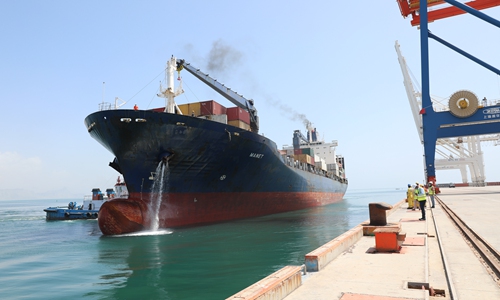
by Irfan Ali 15 June 2020
The world has been going through the most fatal, dangerous and disastrous pandemic, i.e. Covid-19. The social, political, economic, and financial structure of the whole world has been massively disturbed because of Coronavirus. Since December last year the pandemic has halted the smooth running of most of the sectors all over the world. Therefore projects and development works have been experiencing hardships and hurdles in their successful implementation. Because of the disturbance created by the spread of Coronavirus the projects under the Belt and Road Initiative (BRI) such as the China-Pakistan Economic Corridor (CPEC) also face delays. Pakistan, just as most of the nations of the world, also announced lockdown amid the spread of deadly virus. Resultantly the CPEC projects were also stopped because of the absence of local labour who were forced to stay at home to avoid further spread of Covid-19. In addition, the government of Pakistan also announced the travel restrictions which hindered the availability of Chinese workforce from travelling.
As far as Pakistan is concerned, the recent statistics portray that Covid-19 is spreading rapidly throughout the country. The patients of Coronavirus have crossed the one lac mark which is quite an alarming situation for the country. In this regard, the government is very much concerned about the impact of Covid-19 on the construction of the projects under the CPEC. However, the antagonists of CPEC are criticizing the CPEC projects. They believe that Coronavirus will spread through the CPEC projects if works continue on them. Thereby serving as a source of spread of Coronavirus. Nonetheless both the Chinese and Pakistan governments are committed to continuing the work over CPEC projects with the same pace as before Covid-19.
Since the outbreak and fast spread of Coronavirus both the Chinese and Pakistani governments have remained very much conscious about the CPEC projects and hindrances faced by multiple projects amid the Covid-19. Despite the challenging conditions, the government of China is committed to restarting work over the development projects under BRI. Furthermore, it is confident that once the crisis is over, Chinese BRI will lead the global economic recovery. Many countries have benefitted throughout the world from building of the “Health Silk Road” by China. When the world was suffering from the global shortage of medical supplies, Beijing was providing help to various nations in the form of medical equipment and protective gears despite challenging circumstances in China that increased the trust of countries in China.
In this regard, on 02 April 2020, the Prime Minister of Pakistan Imran Khan called the meeting of the National Coordination Committee (NCC) to discuss the Covid-19 situation in the country and its impacts on the economy. In the meeting the NCC decided for the opening of CPEC projects with the resolve that their progress on project should remain unaffected by the pandemic. In that meeting, Pakistan’s PM Imran Khan reviewed the overall situation of the spread of Covid-19 throughout the country. However, an increase in the number of Coronavirus patients in the country caused PM Imran Khan to decide to open the work on the projects of CPEC, including the opening of the construction industry. Similarly, Naghmana Alamgir Hashmi (Pakistan Ambassador to China) while talking to China Global Television Network (CGTN) said that because of the coordination, cooperation and struggles of both China and Pakistan, 90 per cent of the first phase of CPEC was completed and remaining projects would be completed soon. She further explained that Pakistan would complete all the projects under CPEC on time amid Covid-19 because all the preventive measures were taken by the government to decrease and stop the spread of pandemic.
As PM Imran Khan has stated multiple times that virus is not going anywhere, people have to live with virus adhering to the SOPs otherwise the survival of nations like Pakistan is too difficult because of its weak economic conditions and instability. If all industries, factories, and development works remain closed for extended time period, Pakistan’s economy will collapse and people will die of unemployment and hunger. Therefore, the government of Pakistan is in full consultation with the government of China as well as companies working on the CPEC projects. In this regard, Pakistan’s government has also taken effective measures to provide full protection to the Chinese workforce working on CPEC. In addition, the Chinese workers who are returning to Pakistan have to undergo double quarantine system for their safety as well as the safety of other workers.
For further strengthening of CPEC, both countries have signed a Memorandum of Understanding (MOU) with regard to increasing cooperation in areas such as healthcare, education, technology and agriculture under the ambit of CPEC. Furthermore, Gwadar, the key port project of CPEC remained operational during Coronavirus and is functioning well. The primary reason behind the functioning of Gwadar Port is the local employs and a limited number of Chinese staff. Nonetheless, Covid-19 has vastly impacted the global shipping, and most possibly Gwadar Port would not remain unaffected. For now, it is operating well as several ships have dropped by at the Gwadar port. Despite these challenging circumstances owing to Coronavirus, both Beijing and Islamabad are working hard to minimize the effects of a pandemic in an effort to keep the progress on the CPEC project remain unaffected.
The writer is working as a Research Associate at the Strategic Vision Institute (SVI), a non-partisan think-tank based out of Islamabad, and Ph.D. scholar in the Department of Defense and Strategic Studies, Quaid-i-Azam University Islamabad, Pakistan.
